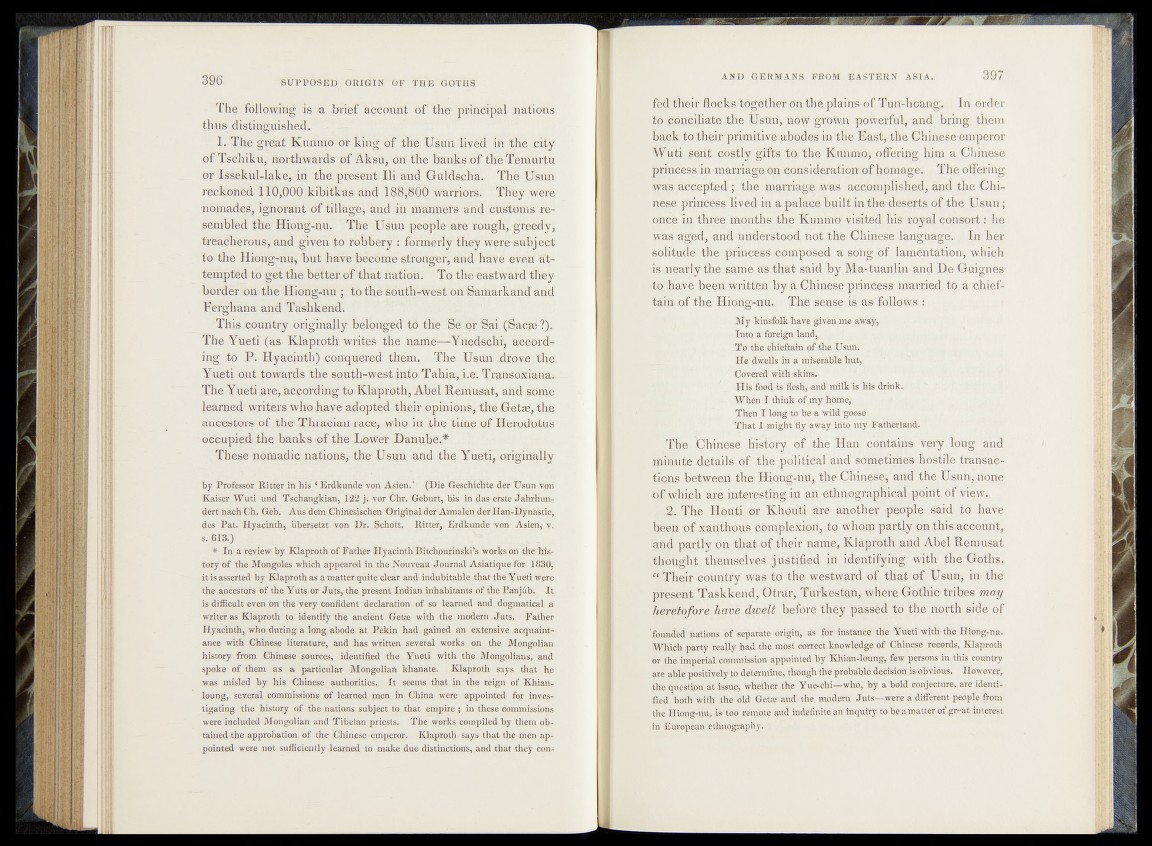
The following ris a brief'acediMt'of the principal’ .nations
thus distpaguiêlject.- -
1. Thegreàt Kurifflo or king%T 'IHè. “ÏJ|u n liv^d^iit tHe di'ty-
of Tschiku, northwards of Aksu, on .the banks of the Temurtu
or fssekül-îàke, iin the present Ili arid. Guldseha. The Usun
reckoned UOjOOO kibitkésfa^à 188y$0Ö warriors. Thëÿ were
nomades, ighorânt of .tillâ'ge^and^1 manners <ihd eustotosYe-
sembféd the Hiong-nu. The Usun people1 are rough, greedy,
treacherous; and given'to robbery : formerly they wiere^übject
to the Hiong-nu, but havël|ebifMè stronger, aridbâŸe 'e^m'at-
tempted to get.the better j?f that nation. To thé eastward they
border on the Hi’ong-Uu ;. to thbeouth-^esfon SamarlfeancFand
Ferghana .and Tashkend.
Xhjs-country originally belonged to the ^âëlor. S|j^S;acto3)-.'
The Yueti (as Klaprotlrwrites the name-—Yuedschi, * according
to P. Hyacinth) conquered them, ^sfllhe1 tUsun dfqiejthe
Yueti out towards the :sputh-west into Tahia, i.e. TraiWdXia$a*-
The Yueti are, according to Klaproth, Abel RémusaÉ, a nd’ £on^ë
learned writers who have adopted their opinion*, the Gbtæ, tno
ancestors, of the Thracian iace, whoiin the» time of lJeiodotin*
occupied the banks of the Lower Danube'.*
These itojaadicmatious, the Usuh and the Yueti, originally
by Professor Ritter in his 4 Erdkunde von A§ien.’\ (Die Geschichte der Usun von
Kaiser Wuti und Tschangkian, 122 j. vor CM. Géburt, bis. in das erstë JaJ&iiun-
dert naeh49i. Geb.- Aus'd'em Chinesisehen Orignal dó1 Annalen dét HàhJjyttâstie,
des Pat. Hyacinth, ubersetzt von Dr. Schott. Ritter^.Erdkunde von Asien, v.
s. 613.)
* In a review by Klaproth of Father Hyacinth Bitchonrinski’s works on the history
of the Mongoles which appeared in the Nouveau Journal Asiatique for. 1830,
it is asserted by Klaproth as a matter quite clear aud indubitable that the Yueti'were
the ancestors of the Yuts or Juts, the present Indian inhabitants of the Panjâb. I t
is difficult even on the very-confident declaration of so learned and dogmatical a
writer as Klaproth to identify the ancient Getae with the . modem Juts. Father
Hyacinth^who during a long abode at Pékin had gained an extensive acquaintance
with Chinese literature, and has written several works on the Mongolian
history from Chinese sources, identified the Yueti .with the Mongolians, and
spoke of them as a particular Mongolian khanate. Klaproth says that he
was misled by his Chinese authorities. I t seems that in. the reign of Khian-
loung, several commissions of learned men in China were appointed for investigating
the history, of the nations subject.to that empire ; in these commissions
were included Mongolian and Tibetan priests. The works compiled by them obtained
the approbation of the Ghinese emperor. Klaproth says that the men appointed
were not sufficiently learned to make due distinctions, and that they con-
MMJieir flocks together- on the plains of Tun-hoang. In order
to : concilia te-the Usun, now grown powerful, and bring them
back f o r t h i t i v e abodes in the East, the Chinese ëmperor
Wuti sent|di9ktlyftgifts.:tiO the Kunmo> offering him a Chinese
princess in marpago'oja consideration of homage. The offering
^a'S.*||efted ; .the marriage .was accomplished, and the Chinese'
prints».lived in a palace built in thé,des6rts of the.Usun;
oppe in threKmqnths the Kunmo" visited his royal consort: he
was agë.d^;jand understood, not the Chinese language. In her
^Solitude the piSdaa^ftpenposed a song of lamentation^ which
is nearly th erap ie a& that said by Ma-tuanlin and De Guignes
to.Ê.a&»tbeen written hy.ar Chinese princess married to a chieftain
of the Hiongr-nu. The sense? is follows :
My kinsfolk have given me away,
, Into a foreign land,, ,
To the chieftain of"fcheJEJsun. „
l i e dwells in a miserable hut,
Covered with' skin's.' ’
His food is flesh; and milk is his drink.
- When I think of my. home,
'r Then I long to be a wild goose
That I might fly away into my Fatherland.
The Chinese history of the Han' contains very long and
pnnute de^ilj^qf tfye’political and sometimes hostile transactions
between the Hiong-nu, the.Chinese/and the Usun, none
of which aré intqmlüngin an ethnographical point of view.
, 2. The.Houti-or Khouti are.another peUple said to have
Mqn.of xanthous complexion, to whom partly, on this account,
and partly on that of their name, Klaproth and Abel Renmsat
th^pght themselves justified in identifying with the Goths.
“ Their country was to the westward of that of Usun, in the
present Taskkend, Otrar, Turkestan, whjére Gothic tribes may
heretofore have dwelt before they passed to the north side of
‘founded nations of separate origin, as for instance;the Yueti with the Hfong-nu.
Which party really had the most correct knowledge of Chinese records, Klaproth
or the imperial commission appointed by Khian-loung, few persons in this country
are able positively to determine, though the probable decision is obvious. However,
the qdekidn at issue, whether the Yue-chi4-who, by a bold conjecture, are identified
both with the old Geta? and the modem Juts—were a different people from
the Hiong-nu, is too remote jp l indefinite an inquiry to be a matter of great interest
in European ethnography.